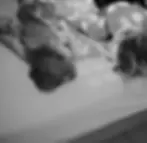How to Get an Overtired Baby to Sleep: Real Advice That Actually Helps
- May 19, 2025
- 5 min read

If you’re here, you’re probably running on fumes. Maybe it’s 9 PM, your baby has been fussing for what feels like hours, and you’re Googling how to get an overtired baby to sleep in desperation. First of all—deep breath. You’re not alone, and more importantly, there’s a path forward.
Overtiredness can feel like an endless spiral: your baby won’t sleep because they’re overtired, and they’re overtired because they won’t sleep. It’s frustrating, emotional, and exhausting. But here’s the good news: with the right tools, sleep foundations, and a bit of strategy, it is possible to help your overtired baby sleep better—tonight and in the long run.
Let’s break it all down.
What Does “Overtired” Actually Mean?
Overtiredness happens when your baby stays awake past their optimal wake window, which causes a spike in stress hormones like cortisol and adrenaline. These hormones are the opposite of what we want at bedtime—they keep your baby alert, fussy, and fighting sleep even harder.
Here are some common signs your baby may be overtired:
Cranky or inconsolable fussing
Arching their back or flailing arms
Hyperactivity or “wired” energy
Short, broken naps
Frequent night wakings
Taking forever to settle for sleep
This isn’t just a “bad mood”—it’s a real physiological state, and it’s tough for babies to bounce back from, especially if they don’t yet know how to fall asleep independently.
Why Sleep Foundations Are the Secret Weapon
One of the biggest misconceptions about sleep training is that it’s only useful when everything’s going perfectly. But real life isn’t always nap-perfect. There are doctor appointments that run late, family dinners that stretch into bedtime, skipped naps, or unexpected stimulation. That’s just life with a baby.
The difference? When your child has healthy sleep foundations and knows how to fall asleep on their own, those bumps in the schedule don’t derail everything.
Babies who can self-settle may still get overtired, but it’s not a day-ruiner. It’s a temporary hiccup, not a disaster. The ability to fall asleep independently gives them the tools to reset, regulate, and rest—even when they’ve pushed past their usual limits.
👉 Related: Read my blog on Wake Windows & Sleepy Cues👉 Resource: Download Your Sleep Cheat Sheet eBook

How to Get an Overtired Baby to Fall Asleep
Now for the big question: What do you do when your baby is overtired and struggling to sleep?
Here’s what I recommend from both a developmental and practical standpoint:
1. Put Them Down—And Give Them Space: It may sound counterintuitive, but the most effective way to help an overtired baby sleep is often to put them down in a dark, quiet room and allow them the space to settle. Many parents try more soothing—bouncing, rocking, feeding to sleep—but often these can overstimulate an already exhausted baby.
Overtired babies are already dysregulated. Adding more touch, movement, or talking can actually amp them up further. They may cry when you put them down, but that doesn’t always mean something is wrong. Sometimes they need to release that built-up tension before they can fall asleep.
2. Minimize Stimulation: Turn off the overhead lights. Skip the mobile. Don’t add extra lullabies or chatter. Babies who are overtired need less, not more.
Keep the room:
Dark
Cool (68–72°F is ideal)
Quiet
The Power of Proper Wake Windows
One of the most effective ways to prevent overtiredness—and help recover from it—is understanding your baby’s wake windows.
Wake windows are the periods of time your baby can comfortably stay awake between naps and bedtime. These windows grow longer with age, but missing the mark consistently leads to overtiredness, fussiness, and broken sleep.
Here’s a "rough guide" (grab the full chart and more exact wake windows in my eBook!):
Age | Wake Window |
0–2 months | 45–60 mins |
3–4 months | 60–90 mins |
5–6 months | 1.5–2.5 hours |
7–9 months | 2–3 hours |
10–12 months | 2.5–4 hours |
👉 Download Your Sleep Tool Kit for exact wake window ranges and nap needs by age.
If your baby is consistently overtired, chances are their wake windows are being stretched too long—or they’re missing early sleepy cues.

Feeding + Overtiredness: What to Know
One tricky part of overtiredness is that it can affect everything—including feeding. Some parents try to “top off” their baby before sleep, only to find their little one refusing the breast or bottle, arching, or fussing.
Why? Overtired babies are flooded with stress hormones, which can suppress appetite and make feeding feel frustrating. Think of it like trying to eat dinner after an intense workout and an argument—it’s not easy.
Some tips:
Offer a feed well before the end of the wake window if your baby is tired.
Don’t force feed right before sleep if they’re pushing it away.
Focus on a calm, consistent pre-sleep routine instead.
And of course, always rule out hunger as the cause of crying before assuming it’s just overtiredness.
For Babies Who Haven’t Learned to Fall Asleep Independently
Here’s where things get more complicated.
If your baby relies on bouncing, rocking, feeding, or being held to fall asleep—and they’re overtired—they may need even more help to settle. But paradoxically, the more we do, the harder it can be. Soothing techniques that work at the right time may stimulate when your baby is already past the point of calm.
Some low-stimulation soothing options:
Lay baby flat and gently pat their belly or bottom
Use a rhythmic “shhh” or white noise machine
Let them fuss briefly before intervening
If you’re in this situation often, it may be time to gently start building independent sleep skills—so the next time overtiredness strikes, your baby knows what to do.

Sleep Training Helps Babies Handle Overtiredness Better
Contrary to what you might think, sleep training isn’t about rigid routines. It’s about teaching your child to fall asleep on their own, so they can cope better with off days and sleep disruptions.
Even well-rested babies will sometimes get overtired—thanks to skipped naps, travel, or big days out. But when those babies have the skill of falling asleep independently, they recover quicker and rest longer.
Healthy sleep habits = resilience.
If your baby isn’t quite there yet, don’t worry. You can build these foundations gently, gradually, and in a way that works for your parenting style.
What Not to Do When Your Baby Is Overtired
It’s easy to panic when nothing seems to be working, but here are a few common mistakes that can make things harder:
🚫 Don’t try to wear them out more – More activity won’t make them sleepier. It’ll just make them more overtired.
🚫 Don’t overstimulate with screens, toys, or new activities
🚫 Don’t delay sleep hoping for a “longer stretch” later – The opposite usually happens.
Stick with your routine, offer a consistent wind-down, and give your baby the opportunity to settle.
When to Ask for Help
If overtiredness is a daily struggle, and sleep feels like a constant uphill battle—it might be time for extra support.

This is exactly where my 1:1 concierge sleep training comes in. I’ll guide you step by step, customizing a plan based on your baby’s unique needs, temperament, and feeding routines.
Whether you're in the thick of sleep regressions, bedtime resistance, or nap chaos, I’ll help you navigate it all.
With my approach, you're never alone in this.
We'll work together to:
✔️ Build solid, flexible sleep foundations
✔️ Teach your baby independent sleep
✔️ Navigate overtired days with confidence
✔️ Reclaim rest—for your baby and for you
Ready for Better Sleep—Even on the Hard Days?
Overtiredness doesn’t have to be a mystery. With the right knowledge, a little strategy, and a strong sleep foundation, you can help your baby rest better—and recover faster when things go off track.
📩 Download my Sleep Cheat Sheet to get age-appropriate wake windows, nap needs, and more.
💬 Ready for personalized support? Book a call with me and let’s build a plan that works for your family.
You’ve got this—and I’m here to help.





